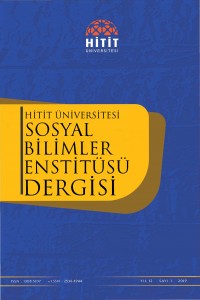Öz
Sürdürülebilir kalkınmanın temel
stratejisi kabul edilen yeşil ekonomi anlayışının çevresel kaygılar ile
ekonomik amaçlar arasındaki çelişkiyi ortadan kaldıracak bir yol olduğu
düşünülmektedir. Bu nedenle, ülkelerin yeşil ekonomiye dair performanslarının
ölçülmesi ve değerlendirilmesi uygulanacak politikalar açısından önem arz
etmektedir. Ancak ekonomik, sosyal ve çevresel boyutlar içermesi nedeniyle, yeşil
ekonominin bu boyutlarını temsil eden alternatif bir ölçü kaynağına ihtiyaç
vardır. Bu çalışmanın amacı, Türkiye’nin yeşil ekonomi performansını ölçmek ve
değerlendirmektir. Bu amaç doğrultusunda, yeşil ekonominin üç farklı boyutunu temsil
ettiği düşünülen, 22 değişkene ilişkin sayısal verilerden hareketle 2000-2015
dönemini kapsayan bir yeşil ekonomi endeksi hesaplanmıştır. Elde edilen endeks
değerlerine göre, Türkiye’nin ele alınan dönemdeki yeşil ekonomi performansının
arttığı söylenebilir. Bu performans artışında özellikle ekonomik ve sosyal
göstergelerdeki olumlu gelişmenin payı büyüktür. Çevresel performansta son
yıllarda olumlu gelişmeler olmakla birlikte, çevresel göstergelerin yeşil
ekonomi performansına katkısı nispeten sınırlı kalmıştır.
Anahtar Kelimeler
Sürdürülebilir Kalkınma Yeşil Ekonomi Yeşil Büyüme Yeşil Ekonomi Endeksi.
Kaynakça
- Referans1 BASS, S. (2013). Scoping a Green Economy: A Brief Guide to Dialogues and Diagnostics for Developing Countries, IEDD, London.
- Referans2 BOWEN, A. (2012). Green Growth: What Does It Mean?, Environmental Scientist, December 2012, 7-11.
- Referans3 BOZLOĞAN, R. (2005). Sürdürülebilir Gelişme Düşüncesinin Tarihsel Arka Planı, Sosyal Siyaset Konferansları Dergisi, 50, 1011-1028.
- Referans4 BRUNDTLAND, G.H. (1987). Our Common Future: Report of the World Commission on Environment and Development, Oxford University Press.
- Referans5 DINIZ, E.M. ve BERMANN, C. (2012), Green Economy and Sustainability, Estudos Avançados, 26(74), 323-329.
- Referans6 DIYAR, S., AKPAROVA, A., TOKTABAYEV, A. TYUTUNNIKOVA, M. (2014). Green Economy Innovation Base Development of Kazakhstan, Procedia Social and Behavioral Sciences, 140, 695-699.
- Referans7 EEA (2013). Towards a Green Economy in Europe EU Environmental Policy Targets and Objectives 2010-2050, European Environment Agency EEA Report, 8/2013, 1-52.
- Referans8 GGGI (2012). Green Growth Planning GGGI Country Programs
- Referans9 IUCN (1980). World Conservatıon Strategy Living Resource Conservation for Sustainable Development, International Union for Conservation of Nature and Natural Resources, 1-77.
- Referans10 JONES, B. (2011). Driving a Green Economy through Public finance and Fiscal Policy Reform, Journal of International Commerce, Economics and Policy, 2(2), 325-349.
- Referans11 KARARACH, G., NHAMO, G., MUBILA, M., NHAMO, S. NHAMECHENA, C. ve BABU, S. (2018). Reflections on the Green Growth Index for Developing Countries: A Focus of Selected African Countries, Development Policy Review, 36, 432-454.
- Referans12 KASZTELAN, A. (2017). Green Growth, Green Economy and Sustainable Development: Terminological and Relational Discourse, Prague Economic Papers, 26(4), 487-499.
- Referans13 MEADOWS, D.H., MEADOWS, D.L., RANDERS, J. ve BEHRENS III, W.W., (1972). The Limits to Growth, A Report for The Club of Rome’s Project on the Predicament of Mankind, Universe Books.
- Referans14 NAHMAN, A., MAHUMANI, B.K ve LANGE W.J. (2016). Beyond GDP: Towards a Green Economy Index, Development Southern Africa, 33(2), 215-233.
- Referans15 OECD (2002), Aggregated Environmental Indices Review of Aggregation Methodologies in Use, Organization for Economic Co-operation and Development.
- Referans16 OECD (2011), Towards Green Growth: A Summary for Policy Makers, Organization for Economic Co-operation and Development, May 2011.
- Referans17 SCHLOR, H., VENGHAUS, S. ve HAKE, J.F. (2017). Green Economy Innovation Index (GEII)- A Normative Innovation Approach for Germany & Its FEW Nexus, Energy Procedia, 142, 2310-2316.
- Referans18 SOUSSAN, J.G. (1992). Sustainable Development: Environmental Issues in the 1990’s, A.M. Mannion ve S.R. Bowlby (ed.), John Wiley & Sons, West Sussex, England, 21-35.
- Referans19 TEIXEIRA, J.R, PINHEIRO, D.S. ve VILASBOAS, A.E.S. (2015), Socioeconomic And Environmental Performance: A Composite Index & Comparative Application to the USA & China, Cadmus, 2(5), 146-164.
- Referans20 UNEP (2011). A Green Economy in the Context of Sustainable Development and Poverty Eradication: What Are the Implications for Africa, United Nation Economic and Social Council Economic Commission for Africa, 1-37.
- Referans21 UNESCAP (2012). Green Growth, Resources and Resilience. Environmentally Sustainability in Asia and the Pacific. United Nations and Asian Development Bank Publication, Bangkok.
- Referans22 VELAME, I.S. ve TEIXEIRA, J.R. (2017). Green Economy and Sustainable Development: The Latin America Scenario, Erudito e-Journal of the World Academy of Art & Science, 2(3), 28-38.
- Referans23 VILASBOAS, A.E.S. ve TEIXEIRA, J.R. (2016). Green Economy Index: Brazil towards a Sustainable Economy, Tex for Discussion University of Brasilia, Department of Economics.
- Referans24 WORLD BANK (2012). Inclusive Green Growth: The Pathway to Sustainable Development, The World Bank, Washington D.C.
- Referans25 YALÇIN, A.Z. (2016). Sürdürülebilir Kalkınma İçin Yeşil Ekonomi Düşüncesi ve Mali Politikalar, Çankırı Karatekin Üniversitesi İktisadi ve İdari Bilimler Fakültesi Dergisi, 6(1), 749-775.
Ayrıntılar
| Birincil Dil | Türkçe |
|---|---|
| Bölüm | Makaleler |
| Yazarlar | |
| Yayımlanma Tarihi | 30 Haziran 2019 |
| Yayımlandığı Sayı | Yıl 2019 Cilt: 12 Sayı: 1 |


